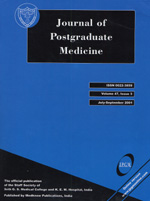
|
Journal of Postgraduate Medicine
Medknow Publications and Staff Society of Seth GS Medical College and KEM Hospital, Mumbai, India
ISSN: 0022-3859
EISSN: 0022-3859
Vol. 57, No. 1, 2011, pp. 16-19
|
 Bioline Code: jp11005
Bioline Code: jp11005
Full paper language: English
Document type: Research Article
Document available free of charge
|
|
|
Journal of Postgraduate Medicine, Vol. 57, No. 1, 2011, pp. 16-19
| en |
The obstetric outcome following treatment in a cohort of patients with antiphospholipid antibody syndrome in a tertiary care center
Dadhwal, V.; Sharma, A. K.; Deka, D.; Gupta, B. & Mittal, S.
Abstract
Background: Antiphospholipid antibody syndrome (APAS) is regarded as the most frequently acquired risk factor for thrombophilia. The obstetric manifestations of APAS include early or late pregnancy losses and complications like preeclampsia and fetal growth restriction. Its timely diagnosis and treatment can improve maternal and neonatal outcome.
Aims: To study the pregnancy outcome of patients with APAS treated with heparin and aspirin.
Settings and Design: This was a retrospective study of pregnancy outcome in 42 consecutive women with APAS, treated with heparin and aspirin.
Materials and Methods: The case records of 42 diagnosed cases of APAS with pregnancy, over a 3-year period, were studied. The pregnancy outcome in this group was compared before and after treatment with heparin and low-dose aspirin in terms of abortions, intrauterine deaths and live birth rate. The outcome of the present pregnancy in terms of fetal and maternal complications was analyzed.
Results: The mean age and average parity of women with APAS were 30.1±4.1 years and 3.2±1.2, respectively. Among the treated patients of APAS, 13 (30.9%) had preeclampsia and 9 (21.4%) had intrauterine growth restriction (IUGR). There were 2 (4.7%) intrauterine deaths, 4 (9.5%) missed abortions and 3 (7.1%) abruptio placentae. Women with APAS had a live birth rate of 4.6% before treatment and 85.7% in the index pregnancy after treatment.
Conclusion: Treatment of pregnant women with APAS results in marked improvement in the live birth rate (4.6-85.7%). However, complications like preeclampsia and IUGR occur even after treatment, requiring strict monitoring and timely delivery.
Keywords
Antiphospholipid antibody syndrome, aspirin, heparin, pregnancy outcome
|
| |
© Copyright 2011 Journal of Postgraduate Medicine.
Alternative site location: http://www.jpgmonline.com
|
|
